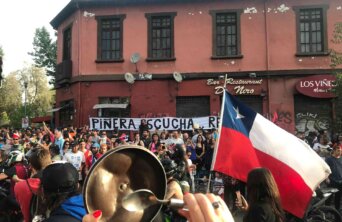- About
- Topics
- Picks
- Audio
- Story
- In-Depth
- Opinion
- News
- Donate
- Signup for our newsletterOur Editors' Best Picks.Send
Read, Debate: Engage.
| topic: | Election |
|---|---|
| located: | Chile |
| editor: | Ellen Nemitz |
It has been almost four years since the Chilean population protested in the streets to show its overall dissatisfaction with the government. Since then, Chile has taken measures to address the public’s discontent: it has elected a new president - the left-wing Gabriel Boric, who now faces low approval rates despite several popular policies, such as increases to the minimum wages and the reparation law for femicide victims; Chile has also agreed that the country was in need of a new Constitution. However, the first attempt to approve a new draft, considered very progressive, failed to pass last year.
This story just reached a new chapter: paradoxically, Chileans have chosen a right-wing party to lead the writing of the new constitution draft. On 7 May, a plebiscite gave the majority, and therefore the power, to the Republican Party led by former candidate José Antonio Kast, a politician known for his polemical defence of Augusto Pinochet, the military dictator who was in charge from 1973 to 1990. According to specialists, the victory of his party puts the future of the whole constitutional process in doubt.
Since the 1980s, Chile has been under the same Constitution, which was authored during Augusto Pinochet’s dictatorship and lacked basic rights such as security, healthcare, education and even water services, according to specialists. The professor at Alberto Hurtado University, Alexis Omar Cortés Morales, told to FairPlanet that the COVID-19 pandemic had intensified the necessity for a new constitution and of rethinking the societal model implemented during the dictatorship until the present day, in order to build "more supportive and less individualistic societies."
The previous draft put into vote in 2022 has been rejected supposedly for being too progressive, but also due to the loss of legitimacy of the constitutional convention - now drastically changed - along with economic factors, such as the devaluation of Chilean currency and the high inflation rate, as assessed by the political scientist Fiorella Ulloa. A far-right group to lead the new text, however, can mostly maintain the same basic principles of the current Constitution, ignoring the previously proposed advancements in human rights and environmental protection.
The General Coordinator at the Progressive International, David Adler, explains that the results are concerning since "Chile could end up with a worse constitution than before." A similar opinion is shared by Claudia Heiss, Head of Political Science at the University of Chile. In an interview with the BBC, she highlighted the strangeness of the new composition of a group whose existence was originally rejected by the right-wing parties, surmising that the new Magna Carta is most likely to be just as, or even more, conservative than the current one. Nonetheless, Heiss foresees that the new draft might be rejected once again, since "there is enormous electoral volatility, which has more to do with rejection of the adversary" than a real support of one political project.
The global political scene has been trying to read the signs sent by Chileans. What is clear by now is that this is a country afraid of drastic changes - considering the overwhelming rejection of the previous draft and the choice for a conservative party to rule the next steps. Also, according to polls, Chileans are not confident about the constitution-writing process and more than a half of the population is not even interested in it.
It will be a real loss if Chile does not take the best of this chance to redesign its most important document due to an incapacity of reaching medium ground. A country deeply divided between right and left is unable to see the benefits of giving up its tight beliefs to advance social rights, and should step away from factional politics to ensure a high quality of life for its citizens.
Image by Guido Coppa

